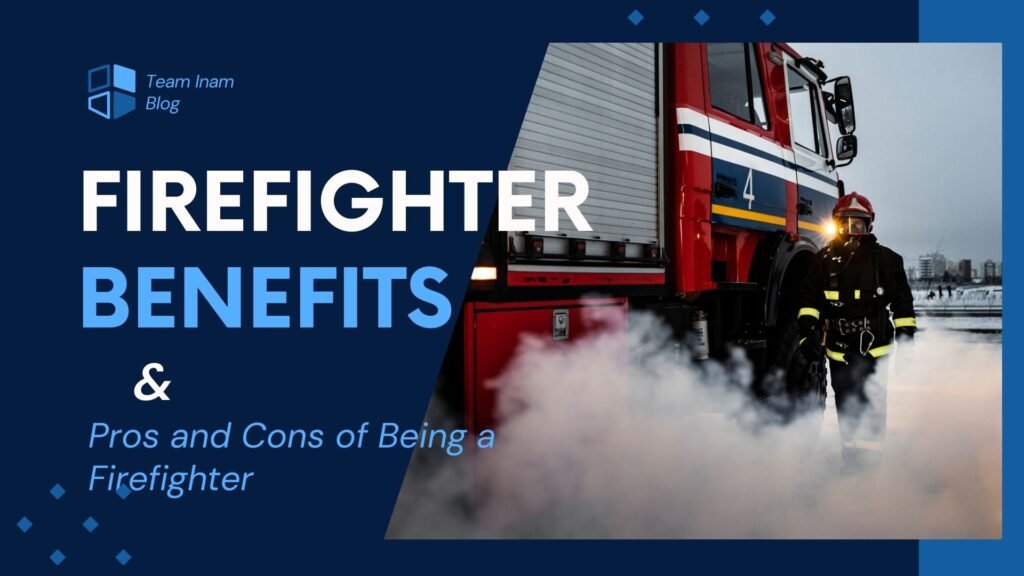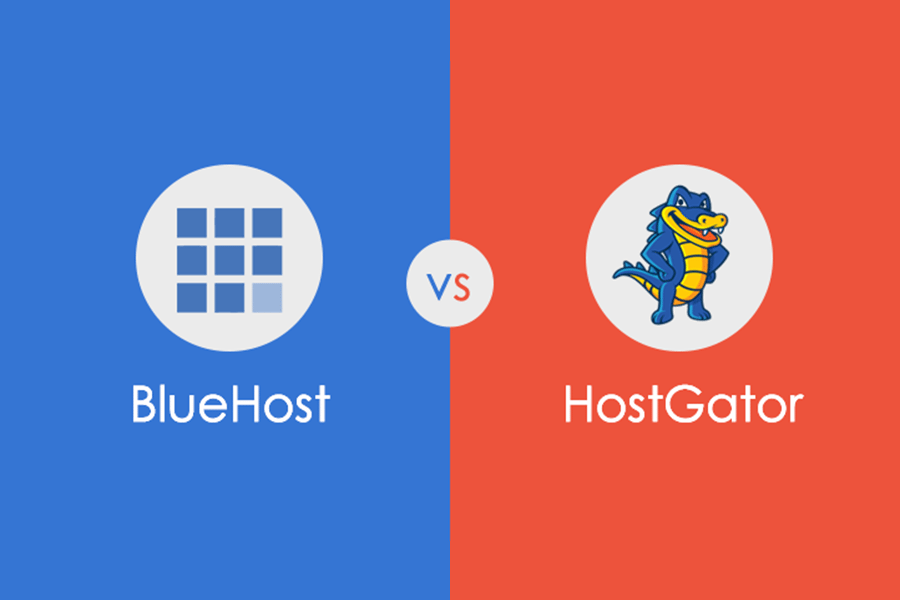Introduction
Being a firefighter is not just a job; it’s a calling that requires courage, dedication, and a strong sense of community. These first responders are often the first on the scene of fires, accidents, and other emergencies, risking their lives to save others. While the role is demanding, it comes with numerous benefits that make it a rewarding career. In this article, we’ll delve into the pros and cons of being a firefighter, why it might be the right career choice for you, and the various aspects of the job that can make it both challenging and fulfilling.
A Day in the Life of a Firefighter
See the adrenaline-fueled world of a firefighter from the perspective of an established firefighter captain. Follow Ted through a typical workday, from emergency calls to equipment checks and everything in between.
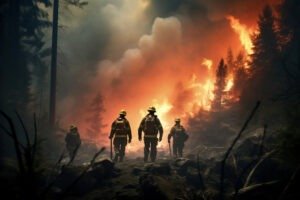
firefighters benefits
Summary of Firefighter Benefits;
| Topic | Details |
|---|---|
| Role of a Firefighter | Responds to fires, medical emergencies, accidents, and various disasters. Requires high physical fitness, mental resilience, and a commitment to community service. |
| Pros of Being a Firefighter | 1. Maintain Physical Fitness: Requires regular exercise and strength. Many firehouses have on-site gyms.
2. Help People and Save Lives: Provides deep satisfaction and purpose. 3. Benefit from Fellowship and Discipline: Forms strong bonds with colleagues, fostering a sense of family. 4. Operate Powerful Equipment: Handles advanced equipment like fire trucks and rescue tools. 5. Enjoy Job Security: Stable job market due to the constant need for emergency responders. 6. Build Transferable Skills: Develops teamwork, communication, critical thinking, and empathy. |
| Cons of Being a Firefighter | 1. Constant Training: Requires ongoing education and training.
2. Long Shifts: Often works 24-hour shifts, with varying schedules. 3. Dangerous Job: Faces risks like structural collapses and hazardous materials. 4. Mentally Demanding: Encounters traumatic situations and must cope with mental stress. 5. Physically Demanding: Requires peak physical condition for strenuous activities. |
| Salary and Job Outlook | Average national salary: $44,441 per year. Job outlook: 6% growth through 2029. |
| FAQs | 1. Qualifications: Age, citizenship, physical health, background checks.
2. Experience: Volunteering can be beneficial. 3. Training: Rigorous and continuous. 4. Shifts: Often long and irregular. 5. Physical Fitness: High levels required. 6. Risks: Exposure to flames, smoke, structural collapses. 7. Mental Demands: Support through counseling and stress management. 8. Equipment: Includes fire trucks, hoses, ladders, rescue tools. 9. Career Advancement: Engineer, Lieutenant, Captain, Battalion Chief. 10. Education for Advancement: Bachelor’s degree in fire science or related field. 11. EMT Certification: Valuable for handling medical emergencies. 12. Job Prospects: Steady demand for firefighters. |
Detailed Overview of the Role of a Firefighter
Firefighters are heroes in the truest sense of the word. They are the first responders to emergencies, ranging from fires to medical crises and accidents. Their responsibilities extend beyond extinguishing flames; they are often tasked with entering burning buildings, conducting rescues, and ensuring the safety of the public.
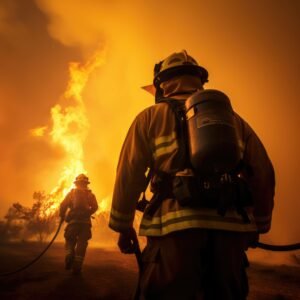
firefighters benifits
Responsibilities:
- Responding to Fires: Firefighters are trained to swiftly respond to fires of all sizes, from small household blazes to large-scale wildfires. They employ various tactics and equipment to contain and extinguish flames while minimizing damage to property and protecting lives.
- Addressing Medical Emergencies: In addition to firefighting, firefighters are often certified emergency medical technicians (EMTs) or paramedics. They provide crucial medical assistance at accident scenes, administering first aid, stabilizing patients, and preparing them for transport to medical facilities.
- Performing Rescues: Firefighters frequently find themselves in situations where lives are at risk, such as trapped individuals in burning buildings, car accidents, or natural disasters. They employ specialized tools and techniques to extricate victims safely and efficiently.
- Ensuring Public Safety: Beyond emergency response, firefighters play a vital role in educating the public about fire safety and prevention. They conduct community outreach programs, school visits, and fire drills to raise awareness and promote safety measures.
Skills and Qualities:
- Physical Fitness: Firefighting is physically demanding, requiring strength, agility, and endurance to navigate hazardous environments and carry heavy equipment.
- Mental Resilience: Firefighters must remain calm and focused under pressure, making split-second decisions in life-threatening situations while coping with stress and trauma.
- Technical Proficiency: Mastery of firefighting equipment, tools, and techniques is essential for effectively combating fires and executing rescue operations.
- Teamwork and Communication: Firefighters work closely as a team, relying on clear communication, coordination, and trust to achieve their objectives safely and efficiently.
- Commitment to Community Service: A deep sense of duty and dedication to serving others drives firefighters to put themselves in harm’s way to protect their communities.
The Pros of Being a Firefighter
- Maintain Physical Fitness
- Firefighting is a physically demanding job that requires regular exercise and strength. Many firehouses have on-site gyms, allowing firefighters to stay in top physical condition.
- Help People and Save Lives
- One of the most rewarding aspects of being a firefighter is the opportunity to save lives and help those in need. This aspect of the job provides a deep sense of satisfaction and purpose.
- Benefit from Fellowship and Discipline
- Firefighters form strong bonds with their colleagues, working closely together in high-pressure situations. This camaraderie fosters a sense of family and mutual support.
- Operate Powerful Equipment
- Firefighters get to handle advanced, powerful equipment, including fire trucks, hoses, and rescue tools. This aspect of the job can be particularly exciting for those who enjoy working with their hands and technology.
- Enjoy Job Security
- Despite advancements in fire safety and building codes, the need for firefighters remains constant. They are essential for responding to emergencies, ensuring a stable and secure job market.
- Build Transferable Skills
- The skills developed as a firefighter, such as teamwork, communication, critical thinking, and empathy, are highly transferable to other careers.
The Cons of Being a Firefighter
- Constant Training
- Firefighters must undergo continuous training to keep up with new techniques, equipment, and safety protocols. This commitment to ongoing education can be time-consuming.
- Long Shifts
- Firefighters often work long, irregular hours, including 24-hour shifts. This schedule can be challenging, particularly for those with families or other commitments.
- Dangerous Job
- The nature of firefighting is inherently risky. Firefighters face potential dangers such as collapsing structures, hazardous materials, and extreme weather conditions.
- Mentally Demanding
- Firefighters frequently encounter traumatic situations, which can take a toll on their mental health. They must be resilient and have access to support systems to cope with the stress.
- Physically Demanding
- The physical demands of the job are significant, requiring firefighters to be in peak physical condition to perform tasks like breaking through debris, carrying heavy equipment, and rescuing victims.
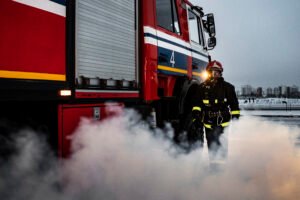
firefighters benifits
Detailed Analysis of Salary and Job Outlook for Firefighters
Firefighters play a crucial role in safeguarding communities, and understanding their salary and job outlook provides valuable insights into the profession’s rewards and opportunities.
Salary Overview:
- Average National Salary: Firefighters earn an average national salary of $44,441 per year. However, it’s essential to note that salaries can vary significantly based on factors such as experience, location, and certifications.
- Factors Affecting Salary: Experienced firefighters or those with specialized certifications, such as paramedic or hazardous materials training, may command higher salaries. Additionally, firefighters working in urban areas or regions with a higher cost of living typically earn higher wages to compensate for the increased expenses.
- Benefits and Compensation: In addition to base salaries, firefighters often receive a comprehensive benefits package, including health insurance, retirement plans, and paid time off. These benefits enhance the overall compensation package and provide financial security for firefighters and their families.
Job Outlook:
- Positive Growth Rate: According to the Bureau of Labor Statistics, the job outlook for firefighters is positive, with an expected growth rate of 6% through 2029. This growth rate is faster than the average for all industries, indicating a steady demand for firefighting professionals.
- Reasons for Growth: Several factors contribute to the continued demand for firefighters. While advancements in fire safety technology and building codes have led to a decrease in the number of fires, communities still require emergency response teams to handle various crises, including medical emergencies, natural disasters, and hazardous materials incidents.
- Opportunities for Advancement: As firefighters gain experience and expertise, they may have opportunities for advancement within their departments. Advancement options may include promotion to positions such as Engineer, Lieutenant, Captain, or Battalion Chief, each with increased responsibilities and corresponding salary increases.
- Continuous Need for Emergency Responders: Firefighters are essential frontline responders who play a critical role in maintaining public safety and protecting communities from harm. As such, the demand for skilled and dedicated firefighters is expected to remain steady, ensuring job stability and career opportunities for those entering the profession.
FAQs About Becoming a Firefighter
How do I become a firefighter?
- To become a firefighter, you need to meet specific requirements related to age, citizenship, criminal history, and physical health. Volunteering at your local fire department is a great way to gain experience and improve your chances of landing a full-time position.
What should entry-level firefighters know?
- New firefighters should be prepared for a dynamic and challenging environment. Staying committed to excellence, being open to continuous learning, and maintaining a positive attitude are crucial for success.
What can set me apart from the competition?
- Obtaining an EMT certification, preparing thoroughly for tests, expanding your job search area, and applying as soon as possible can increase your chances of getting hired.
Are there opportunities for advancement?
- Yes, firefighters can advance to positions such as Engineer, Lieutenant, Captain, and Battalion Chief. Higher positions may require additional education, such as a bachelor’s degree in fire science or public administration.
Conclusion
A career as a firefighter offers a unique blend of challenges and rewards. The physical demands, the risks, and the mental stress are balanced by the satisfaction of helping others, job security, and the development of valuable skills. For those who are dedicated, resilient, and passionate about serving their community, firefighting can be an incredibly fulfilling career.
Whether you’re inspired by the adrenaline rush, the opportunity to make a difference, or the camaraderie among firefighters, this profession offers a path that is as rewarding as it is challenging. If you’re considering becoming a firefighter, weigh the pros and cons carefully, and prepare to embark on a journey that few are brave enough to take.
Your feedback means the world to us! Drop your thoughts in the comments or share your brilliant suggestions with us!
FAQs About Being a Firefighter
- What qualifications do I need to become a firefighter?
- To become a firefighter, you typically need to meet requirements related to age, citizenship, physical health, and background checks. Specific requirements vary by state and department.
- Is previous experience necessary to become a firefighter?
- While not always necessary, previous experience, such as volunteering at a local fire department, can be very beneficial and improve your chances of getting hired.
- What kind of training do firefighters undergo?
- Firefighters undergo rigorous training, including physical fitness, firefighting techniques, emergency medical training, and the operation of firefighting equipment. Continuous training is also required to stay updated on new protocols and technologies.
- How long are the typical shifts for firefighters?
- Firefighter shifts can vary but often include long hours, such as 24-hour shifts followed by 48-72 hours off. Some departments may have different schedules, such as 10-hour day shifts and 14-hour night shifts.
- What are the physical fitness requirements for firefighters?
- Firefighters need to maintain high levels of physical fitness to perform their duties effectively. This includes strength, endurance, and the ability to handle heavy equipment and strenuous physical activity.
- What risks do firefighters face on the job?
- Firefighters face various risks, including exposure to flames, smoke inhalation, structural collapses, hazardous materials, and extreme weather conditions.
- How do firefighters cope with the mental demands of the job?
- Firefighters often receive support through counseling services, peer support groups, and stress management training to help cope with the mental demands of witnessing traumatic events.
- What kind of equipment do firefighters use?
- Firefighters use a wide range of equipment, including fire trucks, hoses, ladders, breathing apparatus, and specialized rescue tools. They are also responsible for maintaining and inspecting this equipment.
- Can firefighters advance in their careers?
- Yes, firefighters can advance to higher positions such as Engineer, Lieutenant, Captain, and Battalion Chief. Some departments may require additional education or certifications for these roles.
- What are the educational requirements for higher positions in firefighting?
- Higher positions may require additional education, such as a bachelor’s degree in fire science, public administration, or a related field. Continuous professional development is also important.
- How does being an EMT help in a firefighting career?
- Many fire departments require or prefer firefighters to have EMT certification because much of their work involves responding to medical emergencies. EMT training provides valuable skills for handling these situations.
- What are the job prospects for firefighters?
- The job outlook for firefighters is positive, with a projected growth rate of 6% through 2029. Despite improvements in fire safety, the need for emergency response teams ensures steady demand for firefighters.
Your feedback means the world to us! Drop your thoughts in the comments or share your brilliant suggestions with us!
Our previous articles related to this topic:
Unraveling the Mystery of Green Noise: Pros, Cons, and Side Effects
Exploring the Vertical Labret Piercing: Pros, Cons, and Personal Experiences

